It's a Kaji character analysis called Kaji is The Bond Girl, Not James Bond: Emotional Disguises, Watermelons, and The Day The Earth Stood Still. The first part points out why the movie is influential to Kaji's character, and the rest explains why Kaji's role in the story is to deconstruct the James Bond trope and hide a true feminine personality he wants to keep secret from everyone else. There's also a link to another analysis within this one that explains the symbolic weight of the Adult Quartet; Misato, Kaji, Ritsuko, and Gendo.
It's pretty interesting and features explanations that I've never heard before until now, like the importance of coffee to Kaji's character. Here's the link.
http://fujiij.tumblr.com/post/88618003609/s-s
A transcript under the Spoiler, but without the links to the other analysis.
What’s getting explored:
Why Episode 11 is arguably the most important Kaji episode.
Aligning 2015: The Last Year of Ryoji Kaji with Kaji’s on-screen appearances.
Why Misato is “James Bond”, and Kaji is the “Bond Girl”
The significance behind Kaji’s watermelon garden.
How Kaji, Kaworu, and Yui are connected — and what that means for Mari Makinami Illustrious in Evangelion: Final.
(Many, many thanks to fiendswithbenefits for helping me gather these observations succinctly. This also features analyses by circuitbird and beastworu. Props where props are due.)
Let’s get this melon rolling.
KLAATU = Kaji
I’m kicking off this meta by making a pretty outrageous claim: Episode 11 is the most important, the most crucial episode in understanding Kaji. Episode 11 is more commonly known as the the blackout episode. The most memorable thing Kaji is shown doing is stopping an elevator with his palm: not because he stopped an elevator with his palm, but because it lead to the creation of this gif.
Going by the episode itself, Kaji’s presence doesn’t merit any kind of proper discussion, and it certainly doesn’t merit the first bullet point in this analysis. Going by Episode’s 11 titlescreen, the opposite is true, in that Kaji’s presence allows us to arrive at four conclusions with 100% accuracy:
Kaji was responsible for the electrical supply collapse in Toyko-3,
Kaji is a triple agent,
Kaji will be shot, and Misato will carry the burden of his findings post-mortem,
And most importantly, Kaji is capable of cultivating — and maintaining — a sham identity for 90% of his on-screen appearances.
Before we’re treated to the quick shot of Kaji spidermonkey leaping his way out of a Dogma lift in Episode 13, or talking with his government contact in Episode 15, we can already infer all four of these aforementioned points. Why, and how?
Episode 11 is titled “The Day Toyko-3 Stood Still (In The Still Darkness)” — it’s a direct reference to the 1951 sci-fi film The Day The Earth Stood Still. The movie possesses all the qualities of a prototypical Cold War film, but it’s influential enough for the National Film Registry, and apparently, influential enough for Anno that he incorporated much of its core elements into Neon Genesis Evangelion.
What’s Kaji have to do with all of this? Here’s a quick summary of the film:
Klaatu, an extraterrestrial humanoid, visits Earth to warn the government of an impending inter-planetary crisis. He claims the only way to prevent war is to cast away their differences, abandon their weapons of mass destruction, and pursue world peace.
Of course, no one takes Klaatu’s warning seriously, (rather, they react with indignation/fear), so Klaatu takes up a more unassuming guise of a “carpenter” and befriends a woman named Helen and her young son Barry. All the while, he gauges the suspicions of those around him, as they have no idea he’s the reason why the radio news is raging every morning.
Finding Earthly modes of diplomacy lacking, Klaatu sabotages all electrical power supplies on Earth for thirty minutes to send a message. He seeks refuge in an elevator, but ends up getting trapped inside with Helen. Klaatu admits to his culpability, telling Helen that if he were to be assassinated, she must tell his android bodyguard “klaatu barada nikto” to nip the ensuing destruction in the bud.
What’s more, Klaatu is eventually shot dead by government officials. Helen attempts to relay Klaatu’s message to the appropriate sources, but it proves too late.
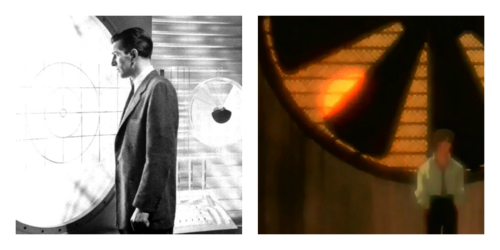
Coupled with the above instance of undisguised visual referencing, well, everything speaks for itself. While the Kaji=Klaatu allusion is the most obvious, there are additional parallels: Misato mirrors Helen, and Shinji is a nod to her son Barry (who looks to be around thirteen to fourteen years old). To top it all off: the pill Kaji gives Misato in Episode 20 is Anno’s answer to the phrase “klaatu barada nikto”.
What we don’t end up seeing is monumental, insofar as predicting the fate of Misato, Kaji, and, well, everyone else. It’s a testament to the combined narrative skills of Anno, Enokido, and Watanabe in this regard: without picking up on the Klaatu reference, Kaji passes — flawlessly so — for the person He Pretends To Be. Unlike Klaatu, Kaji shows no hint of culpability or…. any kind of mental distress, whatsoever. He acts the clown the entire way through — complete with a shirtless joke, and the perfectly innocuous question befitting any freshly employed Inspector:
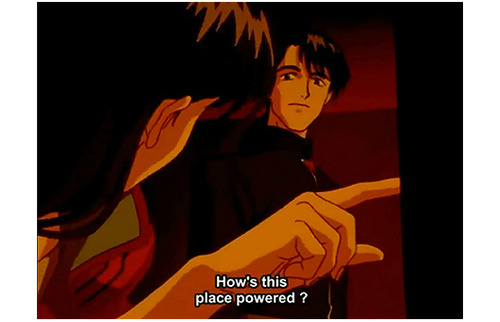
Kaji’s modus operandi? Fronting. It gives NERV personnel more than enough incentive to avoid him (Maya), or underestimate him, or most likely, do a little bit of both. It’s more obscure as to whether the behavior is motivated by a fear of getting caught and/or bearing the responsibility of an accomplice, but regardless, for Kaji this mechanism has become so ingrained that switching from “sincere” to “insincere” is this easy:
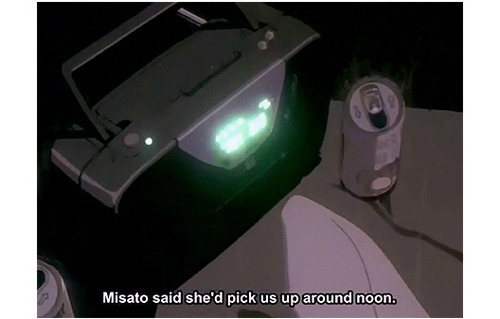
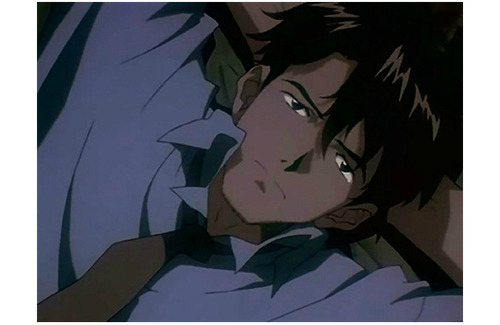
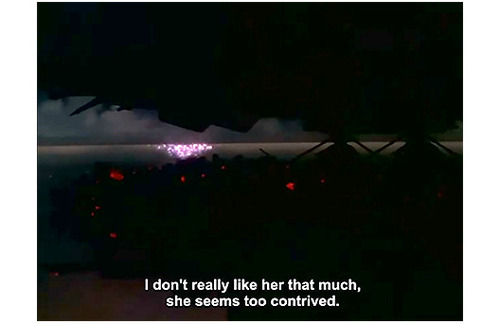

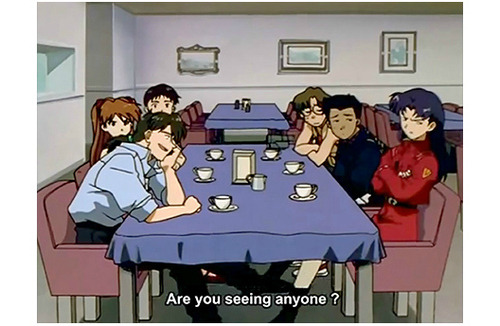
These two scenes are hours apart, in that the very next morning of the beginning of Episode 22 is Episode 8. There’s a jarring instance of irony in Asuka claiming that her dislike of Misato stems from the fact that she’s contrived, by the way — the handler she does like has Misato utterly beat in this department. Easy, effortless teasing, succeeding a grim glimpse over the prospect of entering Misato’s life again, and visa versa.
Notice that Kaji opted not to talk to Misato over the phone: Asuka’s line “Misato said she’s pick us up around noon”, and her subsequent assumption that Kaji may not even know who Misato is, means that Kaji had refused to give any indication that they were romantically involved in college up till this point. It’s an understandable reaction for anyone blindsided by the realization that your lover was cheating on you while you remained unawares. Only in Episode 15 — nearly a decade later — does Kaji learn that Misato did not, in fact, run off and “fall in love with another guy”. In light of that understanding, he is still somewhat hesitant to shrug off his front in Episode 17.
Two questions.
For what reasons would Kaji sabotage Tokyo-3, to the detriment of NERV and the Japanese Ministry? For the same reasons he elects to kidnap Fuyutsuki in Episode 20: it’s in the interest of establishing a connection with SEELE, by proving his qualifications and securing their trust.
And what would SEELE gain, other than an visual idea of NERV’s defense forces? The answer is supplied in the photobook 2015: The Last Year Of Ryohji Kaji, published in 1997 by one of Evangelion's scriptwriters, one month before the release of End of Evangelion.
2015: THE LAST YEAR OF RYOHJI Kaji
" ᴍᴀᴛᴀʀᴀᴇʟ, ᴛʜᴇ ɴɪɴᴛʜ ᴀɴɢᴇʟ.
ɪᴅᴇɴᴛɪғɪᴇᴅ ʙʏ ᴛʜᴇ ɴᴀᴋᴇᴅ ᴇʏᴇ. ᴡᴇ ɢᴏᴛ ɪᴛs ɴᴇᴡ sᴀᴍᴘʟᴇ, ᴛᴀᴋɪɴɢ ᴀᴅᴠᴀɴᴛᴀɢᴇ ᴏғ ᴇʟᴇᴄᴛʀɪᴄɪᴛʏ sᴜᴘᴘʟʏ ʜᴀʟᴛ.
ɪ’ʟʟ sᴇɴᴅ ɪᴛ ᴀғᴛᴇʀ ᴛʜᴇ ᴅᴀᴛᴀ ʙᴀsᴇ ᴏᴜᴛ ᴏғ ɪᴛ. ᴄᴏɴғɪʀᴍ ᴛʜᴇ ᴘᴀssᴡᴏʀᴅ ᴀɢᴀɪɴ. “
By “sample”, I’m thinking Kaji means the viscous, highly-corrosive orange glop that Matarael emits from it’s one, giant sized eye. Kind of gross.
2015 is essentially Kaji’s secret diary. It’s mostly comprised of letters and poems, heavily erring on self-deprecation while Kaji’s prancing around NERV, licking his metaphorical swirly lollipop, and wearing his metaphorical propeller hat. He picks the brains of ambiguous “we’s” and nameless, faceless characters. There’s a voice recording monologue, a lot of bizarre, abstract photographs, and a snapshot of Rei’s apartment room — among other things.
Like this:
" ʜᴇʀᴇ ɪs ᴛʜᴇ ʙᴇɢɪɴɴɪɴɢ ᴏғ ᴛʜᴇ ᴇɴᴅ. ɪ’ᴍ ᴛᴇʟʟɪɴɢ ᴀ ʟɪᴇ ᴇᴠᴇɴ ᴛᴏ ᴍʏsᴇʟғ. ᴅᴀɴᴄɪɴɢ ʟᴇᴛᴛᴇʀs ᴅᴇᴄᴏʀᴀᴛᴇᴅ ᴡɪᴛʜ ʟɪᴇs. ɪғ ᴛʜɪs ʟᴇᴛᴛᴇʀ ᴡᴇʀᴇ ᴡᴏʀᴛʜ ʀᴇᴀᴅɪɴɢ, ᴛʜᴇ ʟɪᴇs ᴡᴏᴜʟᴅ ʙᴇ ᴡᴏʀᴛʜ ᴛᴇʟʟɪɴɢ.
ɪᴛ ɪs sᴏ ᴅɪғғɪᴄᴜʟᴛ ʟɪᴋᴇ ᴛʀʏɪɴɢ ᴛᴏ ɢᴇᴛ sᴏᴍᴇᴛʜɪɴɢ ғʀᴀɢɪʟᴇ ᴏɴ ᴀ sᴡɪɴɢɪɴɢ ʙᴏᴀᴛ. ᴀ ʟɪᴀʀ ᴄᴀɴ ʙᴇ ᴀ ʟɪᴀʀ ᴡʜᴇɴ ʜᴇ ᴋᴇᴇᴘs ʜɪs ʟɪᴇ ᴛᴏ ʜɪs ɢʀᴀᴠᴇ. sᴏ ɪ ᴅᴇᴄɪᴅᴇᴅ ᴛᴏ ᴛᴇʟʟ ʏᴏᴜ ᴀ ʟɪᴇ. ɪ ᴘᴜᴛ ᴛʜɪs ʟᴇᴛᴛᴇʀ ɪɴ ᴛʜᴇ ʙᴏᴛᴛᴏᴍ ᴏғ ᴛʜᴇ ʙᴀɢɢᴀɢᴇ. ʙᴇᴄᴀᴜsᴇ ɴᴏ ᴘᴏsᴛᴍᴀɴ ᴡɪʟʟ ᴄᴏᴍᴇ ᴛᴏ ᴘɪᴄᴋ ɪᴛ ᴜᴘ. ”
This is a display of a strange duality. One one hand, the lies Kaji decides to keep to his grave revolve around convincing people he is much less intelligent, capable, and reflective than he actually is. On the other hand, he obviously is wracked with a kind of impostor-syndrome dilemma, in which he doesn’t believe his “sincere” side to be worth telling.
In the manga, Kaji’s quest for truth is really just a quest for redemption, spurred into motion by a more-than-healthy serving of survivor’s guilt. It’s impossible to say how applicable that is to the anime, and regardless of whether or not Anno and Sadamoto had an idea of Kaji’s backstory during his character proposal, this fact still stands: curiously enough, Kaji is the only cast member not connected to a family member, and by extension, any pre-existing Gehrin personnel:
Misato → her father
Ritsuko → her mother
Gendo → his wife
The Children (pilots and potential pilots alike) → their mothers
Rei and Kaworu → their donors
Fuyutsuki is closely aligned with Gendo and Yui; not family members per se, but they are enduring, familial-like connections nevertheless.
Kaji is a unique case in that he is completely isolated from the complex web of Gehrin relations. The fact that he still manages to discover the truth (instead of being privy to the truth by virtue of position, al la Ritsuko) is pretty exceptional, but not without its costs:
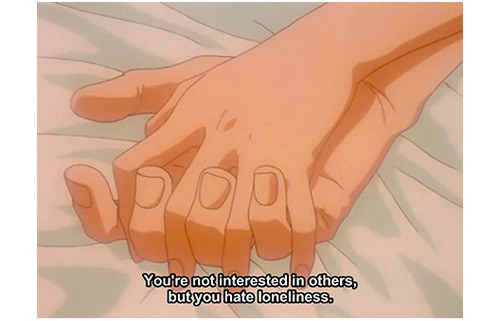
Kaji’s loneliness is in part self-inflicted and levied on him, no thanks to The Second Impact. In 2015, he writes:
" ʜᴀᴠᴇ I sᴀᴛɪsғɪᴇᴅ ᴍʏ sᴏᴜʟ? ᴊᴜsᴛ ᴀ ᴄᴜʀɪᴏsɪᴛʏ ᴀᴛ ᴛʜᴇ ʙᴇɢɪɴɴɪɴɢ
ɴᴏ sᴇɴsᴇ ᴏғ ᴍɪssɪᴏɴ ᴀᴛ ᴀʟʟ
ʙᴜᴛ ɴᴏᴡ ɪ ᴡᴀɴᴛ ᴛᴏ ᴛᴇʟʟ ʏᴏᴜ ᴛʜᴇ ᴛʀᴜᴛʜ
ɪ ᴋɴᴏᴡ ᴛʜɪs ʟᴇᴛᴛᴇʀ ᴡᴏɴ’ᴛ ʙᴇ sᴇɴᴛ ᴛᴏ ʏᴏᴜ
ʙᴇᴄᴀᴜsᴇ ɪ ᴡɪʟʟ ɴᴇᴠᴇʀ ᴘᴏsᴛ ɪᴛ
ᴅᴇsᴘɪᴛᴇ ᴏғ ɪᴛ, ɪ ʜᴀᴠᴇ ᴛʀɪᴇᴅ ᴛᴏ ɪɴғᴏʀᴍ ʏᴏᴜ
ᴅᴏ ɪ ᴡᴀɴᴛ ʏᴏᴜ ᴛᴏ ʀᴇᴍᴇᴍʙᴇʀ ᴍʏ ᴇxɪsᴛᴇɴᴄᴇ?
ʟᴇᴀᴠᴇ ᴏғғ ᴛᴀʟᴋɪɴɢ ᴛᴏ ᴍʏsᴇʟғ
ɪᴛs ᴍᴇᴀɴɪɴɢʟᴇss
ɪ’ᴍ ᴊᴜsᴛ ᴛʀʏɪɴɢ ᴛᴏ ᴛᴀᴋᴇ ʀᴇsᴘᴏɴsɪʙɪʟɪᴛʏ
ɪ ʜᴀᴠᴇ ᴛᴏ ʟᴇᴀᴠᴇ ʜᴇʀᴇ ɴᴏᴡ ”
"Trying to take responsibility" could mean anything. It’s worth noting that Volume 7 of the manga was published in 2001, four years after the publication of 2015. And in the manga, Kaji tries to “take responsibility” for inadvertently killing his brother by starving off what he perceives as undeserved happiness.
Trying is the pivotal word here. By nature of Kaji job(s), taking responsibility isn’t even necessary — he plays NERV, but that’s all well and good, because playing NERV helps him play SEELE, but that’s all well and good, because playing SEELE helps him play… until someone brings it to this game to a violent, grinding halt, the cycle is interminable.
Only after Kaji has more than an shred of certainty that he “has to leave here now” does he admit to any kind of commitment. But even then, it’s a half measure:
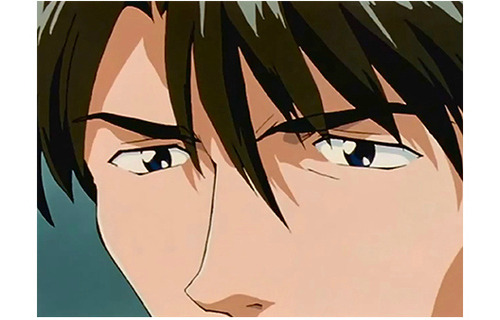
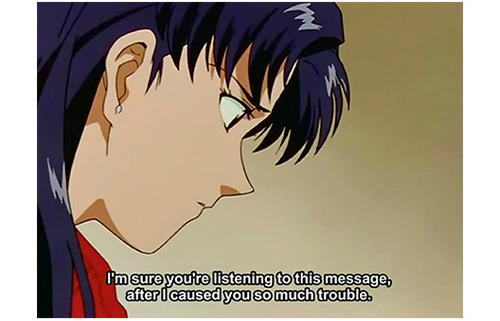
…You don’t invite others into your home when your house is in danger of collapsing. Since the natural consequences (death) supersede any desire to enter a long-term commitment, Kaji’s “you’re late” quip can be taken figuratively rather than literally. Getting shot was a long time in coming — it wasn’t a matter of if, but when.
Was it avoidable? Of course. The answering machine message epitomizes The Hedgehog’s Dilemma™ as it pertains to the functional adult, who are by default not assumed to fumble their interpersonal relationships the way children are expected to. It’s perhaps more accurate to say that it’s The Hedgehog’s Dilemma™ as it pertains to the damaged adult, attempting to act functional for appearances sake.
THE JAMES BOND DECONSTRUCTION
…is a heralding of Misato’s determination more than anything else.
It’s easy to point to Kaji as the James Bond of Evangelion — which is hilarious, as Kaji pretends to fit all the tropes associated with James Bond, as is needed. In reality, all markers point to a completely different label.
Then again, the surface level similarities are almost too easy to identify, which has something to do with their deception: Kaji and James Bond are both double agents, they both are inclined to flirt with anything that casts a shadow, they smoke, drink, have sex, and by principle, work alone. ”Having sex” and “working alone” is of real substance here, since nearly all of the women Bond has sex with are forgettable: written off soon after the deed.
They both are paradigms of traditional hypermasculinity at work. Rather, James Bond is. Kaji is, too, but only upon the most surface level examination.
Kaji is revealed to be an emotional wreck. He resents his loneliness, and admits to loving the one woman he is still hung up over after eight years, the one woman he is actually shown sleeping with. In what is the biggest decimation of the trope, Kaji entrusts all his work in her hands, with the understanding that Misato is much more capable of doing anything about it than he is. Misato takes up the cigarette (literally), and Kaji takes his exit with a resigned smile.
So, he’s more like Bond Girl. “Sincere Kaji” seems to intimately recognize the extent (or lack thereof) of Misato’s sheer tenacity, which explains why he does not resent the comparison to her father in Episode 15. In 2015, Kaji questions if he even wants Misato to remember him — he’s been waffling between convincing himself that it’s better off if she moves on without him. And if that’s her perspective on the state of affairs, then he can only stand back and let her figure it out for herself:
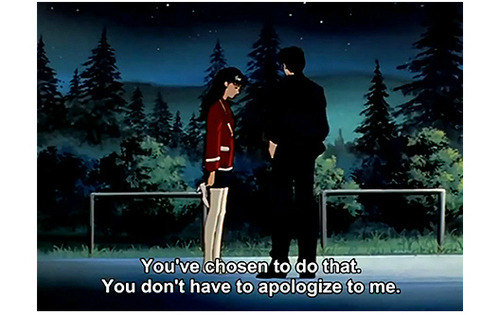
Kaji’s particular approach to death directly foils Gendo’s, who not only represents a more substantive version of hypermasculility, but the struggle for, in a sense, immortality. This post unravels more on that end.
Kaji as “James Bond” (the illusion of cool and unrestrained promiscuity) is a persona built on Kaji exaggerating on traditionally hypermasculine traits, and shrouding his traditionally “feminine” ones.
As to what clues us into the fact that Kaji’s sincere side is dominated by what is traditionally coded as feminine?
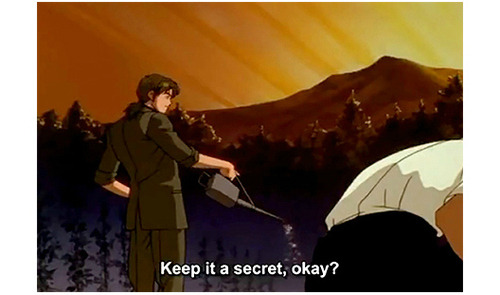
*Other subs translate this line as “It’s a secret from everyone else”, or “Don’t tell anybody.”
Kaji’s gardening work is all parts nurture. He tells Shinji that he derives enjoyment — real enjoyment — from taking care of watermelons, and as we later learn, flowers. He’s even invested in their growth upon the realization that he won’t be available to take care of them, as evident by his plea to Misato on the answering machine. It’s another point worth mentioning that Misato smiles at the mention of Kaji’s flowers, which I take to mean that she is the only one (besides Shinji) who is aware of what’s underneath his front.
And speaking of Shinji — there’s a lot more to be gleaned by juxtaposing Misato and Shinji’s interactions with Kaji and Shinji’s. (Specifically, Kaji-Shinji interactions in the original show. In my personal opinion, Rebuild Kaji has suffered from a character devolution [so far], and isn’t worth mentioning.)
The Misato-Shinji synergy is marked by an assertiveness (one-sided) and strong, dynamic body language (also one sided). Misato sports a classic military seasoning. She’s his formal commanding officer. And if push comes to shove, she has no qualms about physically dragging Shinji if it’s to get him up and doing something.
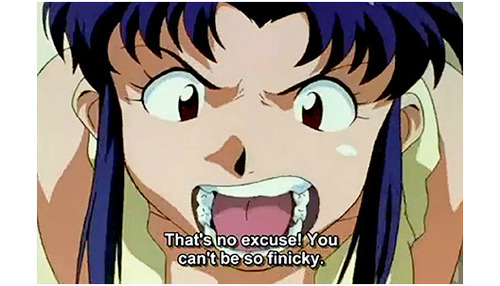
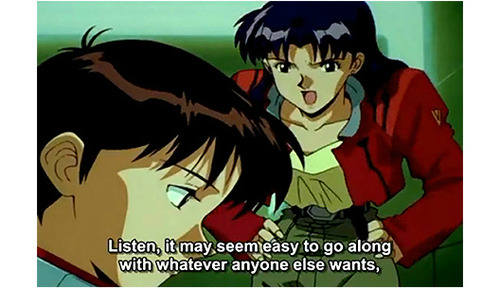
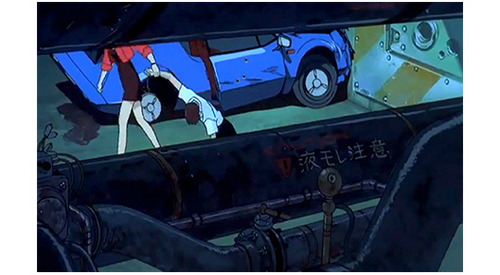
In all of Kaji’s interactions with Shinji (sans their first meeting on the ship), Kaji is in a “nurturing” — even motherly — element (gardening and babysitting). When push comes to shove, and when global destruction is plainly within the realm of possibility (pun not intended), Kaji remarks that no one is forcing Shinji to do anything. While no one can claim Misato to be passive and get away with it, Kaji definitely is.
Note that passivity is oftentimes interchangeable with traditional understandings of femininity.

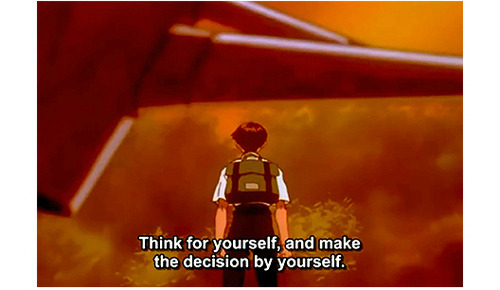
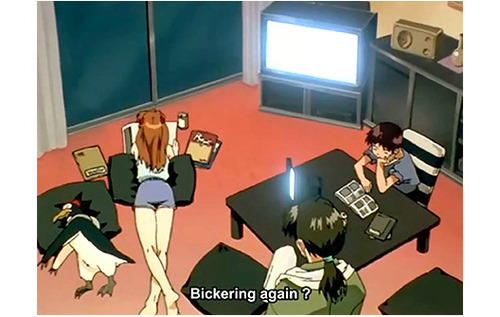
(I also want to harken back to the shot of Kaji telling Shinji to keep his gardening hobby a secret. In Evangelion, the way objects and bodies are positioned in frames are deliberate directorial decisions, and often function as visual clues in and of themselves. In the aforementioned frame, Shinji appears right beneath Kaji’s watering can, creating the impression that Kaji is “watering” Shinji.)
Misato subverts traditional motherly tropes that are taken up by either Shinji or Kaji. Misato doesn’t care to clean her apartment (Shinji steps up to the plate on that front), and is perfectly content with eating snacks and instant cup ramen for as long as her body can stand it — in contrast to Kaji, who goes so far as to grow his own food.
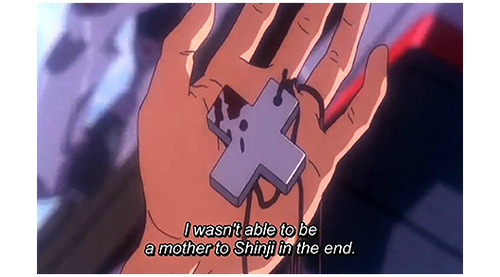
Misato’s perception of motherhood (and fatherhood) merits its own separate analysis, as the conversation is wrought with complexity. But if we’re on the topic of food, the topic of drink naturally follows. Which is the perfect segue into…
COFFEE AND BEER
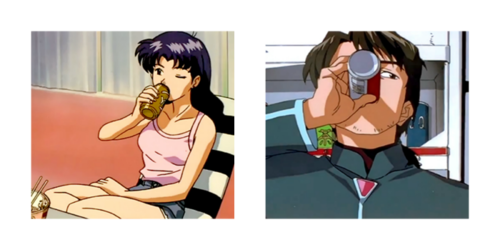
…which may seem to be a digression on my part, but I find the subtext pretty remarkable. It’s a given that Misato’s drink of choice is beer, so much that it’s all that needs to be said, because you’re probably hearing the “huaagh!” sound as you’re reading this sentence.
What’s not so obvious (at least, not initially) is that Kaji’s drink of choice is coffee. Not necessarily because he has a fondness for UCC, but because coffee functions as a visual icon for Kaji himself. (Refer to Asuka’s Hell Kitchen section in this post for more information. Note also that the spilled coffee bears more than a passing resemblance to blood splattering - signifying Kaji’s death.)
Misato isn’t just a drinker — she’s a drinker, in that she lets everyone know exactly how often she does it. She’s also a bit of an understater, because a “little untidy” isn’t the word I would use, and probably not the one Shinji would use either:
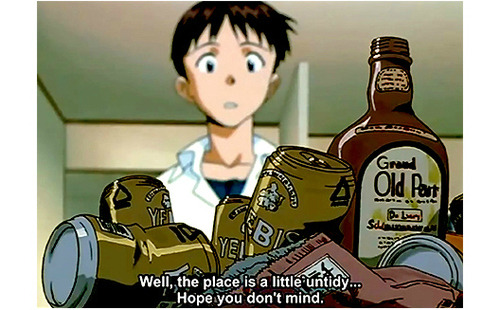
Jump to Episode 17 for a moment. Kaji downs his first can of coffee and chucks it at the trashcan — creating a complete mess in the process — before tapping into “James Bond” mode with the Maya-Kaji sequence.
Misato enters and, during a shot that many regard as puzzling, Kaji neatly organizes the coffee cans in the trash right before switching into his “sincere” side. Like I said, frames are never wasted in Evangelion.
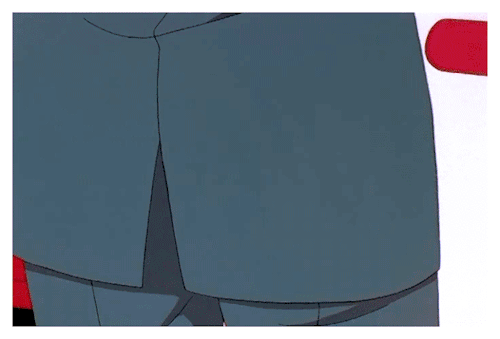
It’s a visual motif. The cluttered coffee cans signify when Kaji’s about to amplifying his front; similarly, the cans are organized when he decides to turn it off. In the very same episode, Shinji remarks that Misato likes “neat guys” when Toji refuses to help clean Rei’s room. Toji’s justification? It’s not the “manly" thing to do.
And of course, when Kaji dies and Misato takes up his work, she makes the switch from beer to coffee:
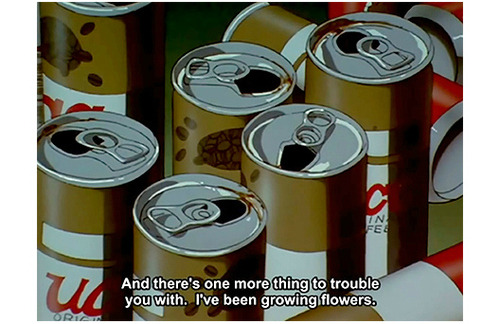
THE PROPERTIES OF THE LOVE INTEREST IN EVANGELION

I’ve discussed a lot about Kaji, and how he relates to both Misato and Shinji. I’m going to wrap things up by mentioning the fact that he also functions as a love interest, which brings about several implications.
When I say “love interest”, I mean those characters that are the primary object of affection for Evangelion's major protagonists and deuteragonists: in the original show, this means Kaworu (Shinji), Kaji (Misato), and Yui (Gendo).
All three of these characters are similar on the grounds that they share a basic, stripped down personality type. They’re simultaneously easygoing, warm, and mysterious. They all have natural inclinations to profundity and philosophizing, to varying degrees. They all have a number of hidden depths. (There are also specific Kaji-Kaworu parallels, which are explored more thoroughly here.)
All three of these characters die, as well. If we want to get into specifics, their deaths are the catalyst exasperating the mental breakdowns of their “other half” - Shinji comes face-to-face with an aggravated form of his depression in the wake of Kaworu’s death, Misato becomes increasingly more solemn and reclusive after Kaji’s — and in the process, fails to keep Asuka from running away. Gendo is the most drastic case in point, as he is wiling to bring about Instrumentality to reunite his with wife once more.
I can’t think of any character in Rebuild who embodies these shared traits better than Mari. Recall how Mari more or less delivers Kaji’s Zeruel speech in 2.22? It’s no surprise she’s being pitted as Asuka’s Kaworu, and it’s no surprise she ends up on this list.
Bodes well for her in Final? It’s impossible to say. 3.33 has shown us that Anno is willing to let Rebuild deviate from what’s expected in a major way, and if Koji Takao’s offhand comment is any indication, Kaji is still alive for 4.0.
2015 will definitely tell.






